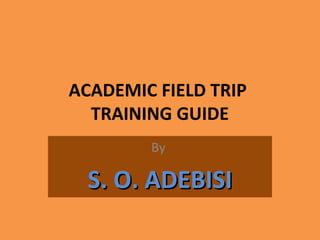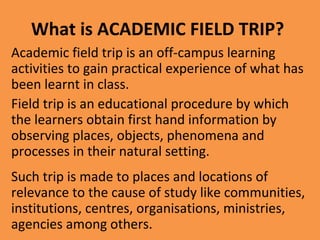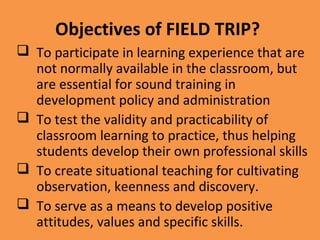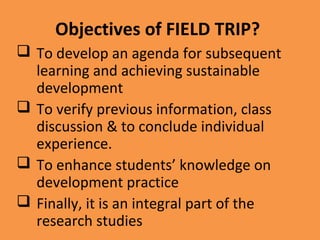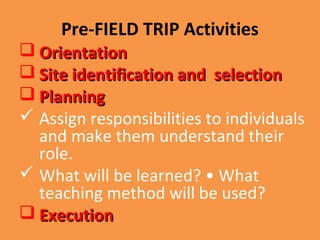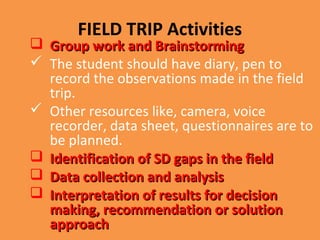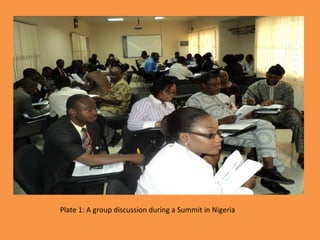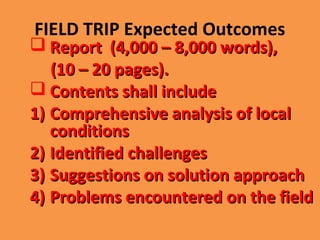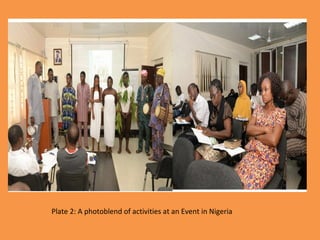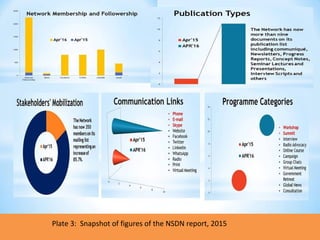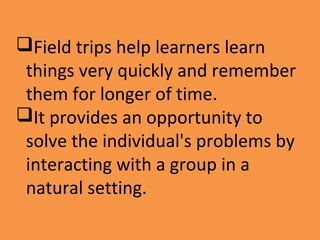ACADEMIC FIELD TRIP
- 1. ACADEMIC FIELD TRIP TRAINING GUIDE By S. O. ADEBISIS. O. ADEBISI
- 2. What is ACADEMIC FIELD TRIP? Academic field trip is an off-campus learning activities to gain practical experience of what has been learnt in class. Field trip is an educational procedure by which the learners obtain first hand information by observing places, objects, phenomena and processes in their natural setting. Such trip is made to places and locations of relevance to the cause of study like communities, institutions, centres, organisations, ministries, agencies among others.
- 3. Objectives of FIELD TRIP? ’ü▒ To participate in learning experience that are not normally available in the classroom, but are essential for sound training in development policy and administration ’ü▒ To test the validity and practicability of classroom learning to practice, thus helping students develop their own professional skills ’ü▒ To create situational teaching for cultivating observation, keenness and discovery. ’ü▒ To serve as a means to develop positive attitudes, values and specific skills.
- 4. Objectives of FIELD TRIP? ’ü▒ To develop an agenda for subsequent learning and achieving sustainable development ’ü▒ To verify previous information, class discussion & to conclude individual experience. ’ü▒ To enhance studentsŌĆÖ knowledge on development practice ’ü▒ Finally, it is an integral part of the research studies
- 5. Pre-FIELD TRIP Activities ’ü▒ OrientationOrientation ’ü▒ Site identification and selectionSite identification and selection ’ü▒ PlanningPlanning ’ā╝ Assign responsibilities to individuals and make them understand their role. ’ā╝ What will be learned? ŌĆó What teaching method will be used? ’ü▒ ExecutionExecution
- 6. FIELD TRIP Activities ’ü▒ Group work and BrainstormingGroup work and Brainstorming ’ā╝ The student should have diary, pen to record the observations made in the field trip. ’ā╝ Other resources like, camera, voice recorder, data sheet, questionnaires are to be planned. ’ü▒ Identification of SD gaps in the fieldIdentification of SD gaps in the field ’ü▒ Data collection and analysisData collection and analysis ’ü▒ Interpretation of results for decisionInterpretation of results for decision making, recommendation or solutionmaking, recommendation or solution approachapproach
- 7. Plate 1: A group discussion during a Summit in Nigeria
- 8. FIELD TRIP Expected Outcomes ’ü▒ Report (4,000 ŌĆō 8,000 words),Report (4,000 ŌĆō 8,000 words), (10 ŌĆō 20 pages).(10 ŌĆō 20 pages). ’ü▒ Contents shall includeContents shall include 1)1) Comprehensive analysis of localComprehensive analysis of local conditionsconditions 2)2) Identified challengesIdentified challenges 3)3) Suggestions on solution approachSuggestions on solution approach 4)4) Problems encountered on the fieldProblems encountered on the field
- 9. Plate 2: A photoblend of activities at an Event in Nigeria
- 10. Plate 3: Snapshot of figures of the NSDN report, 2015
- 11. To What Advantage ???
- 12. ’ü▒Field trips help learners learn things very quickly and remember them for longer of time. ’ü▒It provides an opportunity to solve the individual's problems by interacting with a group in a natural setting.
- 13. Thank You

